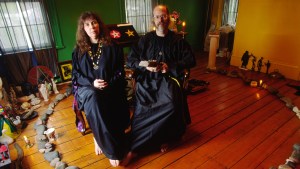Throughout the Bible there is frequent condemnation of witchcraft — usually referring to divination or calling up the souls of the dead — as it is an activity that opposes God and may include the worship of demonic spirits.
In the Old Testament, King Saul falls into despair after seeing the strength of the Philistine army and feels helpless. He wants God to speak to him, but God is silent.
Not satisfied with God’s silence, he takes matters into his own hands and summons the Witch of Endor.
When Saul saw the Philistine camp, he grew afraid and lost heart completely. He consulted the Lord; but the Lord gave no answer, neither in dreams nor by Urim nor through prophets. Then Saul said to his servants, “Find me a medium through whom I can seek counsel.” His servants answered him, “There is a woman in Endor who is a medium.”
1 Samuel 28:5-7
Saul instructs the witch to “Conjure up Samuel for me,” as the prophet Samuel had recently died.
God allows this to happen, but it does not bode well for Saul. Samuel proclaims that, “the Lord will deliver Israel, and you as well, into the hands of the Philistines. By tomorrow you and your sons will be with me, and the Lord will have delivered the army of Israel into the hands of the Philistines” (1 Samuel 28:19).
Later Saul’s consultation of the witch would be recalled as part of the events that led to his death.
So Saul died for his unfaithfulness; he was unfaithful to the Lord in that he did not keep the command of the Lord, and also consulted a medium, seeking guidance, and did not seek guidance from the Lord. Therefore the Lord slew him, and turned the kingdom over to David the son of Jesse.
1 Chronicles 10:13-14
The Church has always condemned witchcraft, as it involves a distrust in God, seeking guidance or power from demonic powers, instead of trusting in the providence of God.


